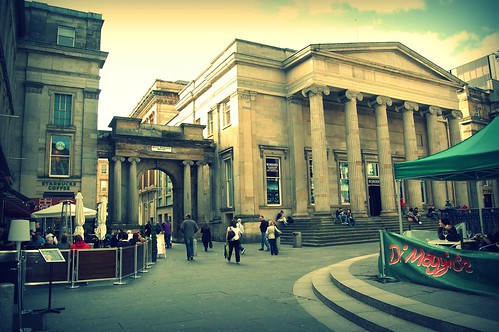 Shopping in Glasgow prior to Christmas was a sad time. Borders, which occupied what is reputed to be the most expensive retail space in Glasgow (the old Royal Bank of Scotland building), announced that it was in administration and was flogging all stock in a gargantuan clearance sale. Borders had become an institution since it opened on Buchannan Street in 1997 (I think) and I'm sure branches in other cities were similarly iconic and located at city centre hot-spots, the London Oxford Street branch being another prime example. It was a great place to meet friends before heading out for dinner or drinks; perusing the amazing magazine or newspaper selection, or browsing the books or music. Of course, I stopped buying books there years ago because the genre classification they used made it impossible to find anything; but it nevertheless occupied a special place in my heart...
Shopping in Glasgow prior to Christmas was a sad time. Borders, which occupied what is reputed to be the most expensive retail space in Glasgow (the old Royal Bank of Scotland building), announced that it was in administration and was flogging all stock in a gargantuan clearance sale. Borders had become an institution since it opened on Buchannan Street in 1997 (I think) and I'm sure branches in other cities were similarly iconic and located at city centre hot-spots, the London Oxford Street branch being another prime example. It was a great place to meet friends before heading out for dinner or drinks; perusing the amazing magazine or newspaper selection, or browsing the books or music. Of course, I stopped buying books there years ago because the genre classification they used made it impossible to find anything; but it nevertheless occupied a special place in my heart...The official line is that Borders fell victim to the current economic climate, although it was a complicated concatenation of economic circumstances, including aggressive competition from online retailers and particularly supermarkets (those supermarkets again – a £3 copy of the latest Jordan autobiography anyone?), a sales downturn and, finally, a lack of credit from suppliers. Waterstone's remains the only national bookseller but today was responsible for a decline in the share price of HMV as their Chief Executive tries to administer 'bookshop CPR' (i.e. let's make our stores more cosy). Can we expect the closure of it too in the foreseeable future? That would be extremely depressing...
Of course it's all depressing news; but one can't help thinking that the demise of super-selling bookshops was a quagmire of their own making. The Net Book Agreement (NBA) – the 100 year long (almost) price fixing of books which collapsed in 1995 – was precipitated by Waterstone's in the first place. And it was precisely the collapse of the NBA which enticed Borders to the UK and enabled Amazon to establish UK operations. Both retailers would not have been able to operate with the NBA still in operation (remember the big Amazon book discounts in the late 1990s?). I suppose none of the book retailers anticipated the level of competitive aggression they had unleashed, particularly from supermarkets. Although I think some naivety played a part...
Many years ago I recall enjoying a talk delivered by the Deputy Chairman of John Smith & Son, Willie Anderson. Despite being the oldest bookseller in the English speaking world, John Smith moved off the high street many years ago. You are now most likely to encounter them as the university campus bookseller. During his talk Willie made an interesting point about the lack of business sense in the book selling industry; that the NBA had made all book sellers blind to conventional business practice or simple economic principles such as the laws of supply and demand. Said Willie (as best as I can remember! It was well over 10 years ago!):
"Harry Potter and the Chamber of Secrets was anticipated to be a best seller and an extremely popular title. We [John Smith & Son] had large pre-orders from customers. Yet, virtually all other booksellers were slashing prices and offering ridiculous pre-order discounts on an item which commanded a high price. At John Smith we didn't offer any discounts and we sold every copy at full price, precisely because demand was high. This is normal business practice, but most book retailers appear to be oblivious to this. Book retailers have a lot to learn about competition because they have been protected from it for so long. The industry needs to learn quickly otherwise it will suffer economic difficulties in the future".What happens now then? There is certainly money to be made in book selling, particularly with the decline of 'good' stockists. There are more books bought now than at any time in history. Perhaps the time is ripe for a renaissance in the classic independent bookshop, of which Reid of Liverpool is archetypal? Supermarkets do not - I think - occupy the same business space as such book sellers and thus allowing the independent retailer to thrive. There wouldn't be any Costa or Starbucks, nor would it occupy a prime retail site, but I think we'd be all the better for it.
(Photo: Laura-Elizabeth, Flickr, Creative Commons)
Very nice piece George. Succinct and interesting and nostalgic!!
ReplyDeleteStop the press! The proliferation of ebooks has resurrected the Net Book Agreement! Well, sort of... Macmillan has informed Amazon that $9.99 is too cheap for a best-seller or new release ebook. Macmillan holds the winning hand though, partly supported by Apple who are on the verge of launching the iBookstore. Read more at The Guardian...
ReplyDelete